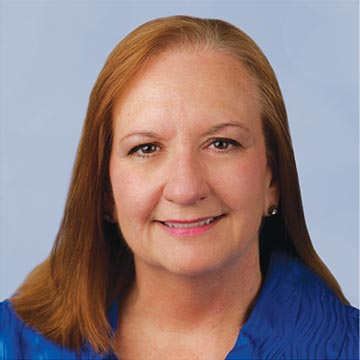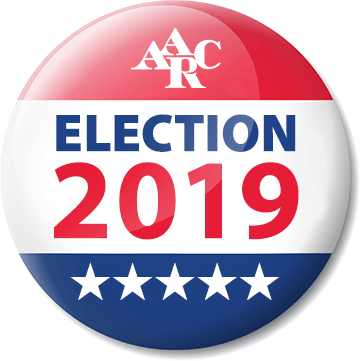Secretary-Treasurer
Lynda Goodfellow, EdD, RRT, FAARC
Georgia State University
Professor and Associate Dean for Academic Affairs
Member Since: 1980
AARC Activities:
- Secretary-Treasurer, 2018
- Chair, Vision Grant Committee, 2018
- Co-Chair, BS to entry Collaborative, 2018
- Vice-President of Internal Affairs, 2015-2016
- Director-at-Large, 2012-2014
- Chair, Taskforce on Competencies for Entry into Respiratory Therapy Practice, 2016
- Chair, Ad Hoc Research Committee, 2016-2017
- Co-Chair, Ad Hoc committee on 2015 and Beyond, 2011-2014
- Member – Ad Hoc Committee on Advanced RT Practices, Credentialing, and Education, 2016-present
- Chair, Education Section, 2009-2011
- Chair- Elect, Education Section, 2008
- Member, Education Section, 1995-present
HOD Activities:
- Delegate, Georgia Society for Respiratory Care, 1990-1991
- Alternate Delegate, Georgia Society for Respiratory Care, 1988-1989
- Chair, Scrutinizing Committee, 1992
Affiliate Activities:
- Past-President, Georgia Society for Respiratory Care, 1994
- President, Georgia Society for Respiratory Care, 1993
- President-Elect, Georgia Society for Respiratory Care, 1992
- Secretary, Georgia Society for Respiratory Care, 1986-1987
- Legislative Committee Chair, Georgia Society for Respiratory Care, 1995-2004
- Chair, Nominations Committee, Georgia Society for Respiratory Care, 1994
- Member PACT, 2002-2004, 2016
- Member, Budget Committee, Georgia Society for Respiratory Care, 1992-1994
- Member, Audit Committee, Georgia Society for Respiratory Care, 1992-1994
- Member, Program Committee, Georgia Society for Respiratory Care, 1984-1985
Related Organizations:
- Member, Association of Schools of Allied Health Professions, 2013-present
- Director, National Asthma Education Certification Board (NAECB), 2014-2016
- Member, Association of Asthma Educators, 2004-present
- Associate Member Georgia Thoracic Society (now Southeast Thoracic Association), 2000-2017
- Certified Basic Life Support Instructor, American Heart Association, 1986-1994, 2005-2011
- Advanced Cardiac Life Support Instructor, American Heart Association, 1990-2007
Education:
- BS Respiratory Therapy, Medical College of Georgia, 1982
- MBA Kennesaw State College, 1989
- EdD Adult Education, University of Georgia, 1999
- RRT, National Board for Respiratory Care
- AE-C, National Asthma Education Certification Board
- RCP, Composite State Board of Medical Examiners of Georgia
Publications:
- Al-Qahtani M, Goodfellow LT, Zimmerman RD, Zavorsky GS. (In Press). Waterpipe Smoking in Healthcare Students at an Urban Research Southeastern University: Prevalence, Knowledge, Attitudes and Motives. Respiratory Care.
- Zavorsky GS, Zimmerman RD, Shendell DG, Goodfellow LT. (In Press). Acute Reduction in Spirometry Values after Prolonged Exercise among Recreational Runners. Respiratory Care.
- Culbreath RR, Goodfellow LT. ECMO and prone positioning in respiratory failure: a systematic literature review. Respiratory Care 2016, 61(2):249-254. (Refereed).
- Goodfellow LT. Foreward – Equipment for Respiratory Care by Teresa Volsko, Robert Chatburn, and Mohamad El-Khatib. Jones & Bartlett Learning. 2016 ISBN: 978-1-4496-5283-8.
- Gardenhire DG, Goodfellow LT. Selected Agents of Pulmonary Value. In Rau’s Respiratory Care Pharmacology, 9th edition, by Douglas Gardenhire, Elsevier Publisher: 2016; ISBN: 978-0-323-29968-8.
- Goodfellow LT. Promotion of a Teacher-Scholar Academy: Mentoring Teacher Scholars to Foster Innovation and Scholarship in the Health Professions. J Allied Health, Winter 2016, 45(4):304-305.
Elections Committee Questions:
What AARC or Chartered Affiliate offices/positions have you held where you feel you made a significant contribution to our profession? What is the contribution and how will you apply it to your new position, if elected?
I was fortunate to be President of the Georgia Society for Respiratory Care (GSRC) in 1993, the year that state licensure (Georgia HB 491) became law. I recall the consensus and networking skills that GSRC members exemplified during this process, which clearly changed the practice of respiratory care in Georgia. Since 2008, my involvement with the AARC on the 2015 and Beyond conferences and subsequent committees are equally significant. As chair of the Taskforce on Competencies for Entry into Respiratory Therapy Practice in 2016, we found of the 202 competencies reviewed, 153 competencies must be proficient upon entry to professional practice and 49 competencies after entry. These two experiences will guide me as I work to further the mission of the AARC.
What experience would you bring to the AARC to accomplish the goals set out by President Walsh?
Being a respiratory therapist is a rewarding and demanding endeavor. The goals related to safety, quality and value are imperative to the future of respiratory care. I believe my experience as an educator is my greatest strength as I want all students to reach their full potential as a respiratory therapist. When we function, as the saying goes, “at the top of our game,” our patients are receiving the best quality care because evidence-based practices are in use. This care is delivered via protocols, disease management pathways or practice guidelines. Our value comes through as a result and this differentiation ensures patient safety and quality of care.
What ideas do you have to attract non-members to join the AARC?
I appreciate my AARC membership for many reasons, not the least of which is belonging to a group of professionals with like-minded values. However, for some, “AARC non-member” is what they seem to prefer. I have often wondered “Why?” Perhaps we have failed to demonstrate that being a “non-member” is not good for your career and leads to a lack of opportunity. There is evidence for this as one nursing study found that the only variable that rated statistically significantly higher by current members as compared to former members was “improvement of my work” (J Perianesth Nurs. 2003 Feb;18(1):8-17). We as individual members cannot just rely on the AARC executive office to recruit new members. Each of us as members must speak to our colleagues, staff and students about their membership. We, above all else, must model the professionalism and involvement that being a member of the AARC requires.
Role-Specific Questions:
How would you, as a member of the AARC Executive Committee, work to move the profession forward based on the work done by our current and previous presidents?
I have a long-sustained history of active participation at the state level, as a specialty section member, as Director-at-large and as Vice-President of Internal Affairs. Therefore, I am very familiar with the direction mapped by the current and previous presidents, going back to Dr. Toni Rodriguez’ tenure in 2008. Their leadership skills have proven to move the profession forward. I will be able to move the profession forward by working with the board of directors, our membership and with other organizations to advance the value and worth of all respiratory therapists who are the “airway expert” to the patients we serve. As chair of the Vision Grant committee, my responsibility is to recommend proposals to the executive committee and board of directors that further the goals of the AARC in a way that professionally and educationally move the profession forward.







